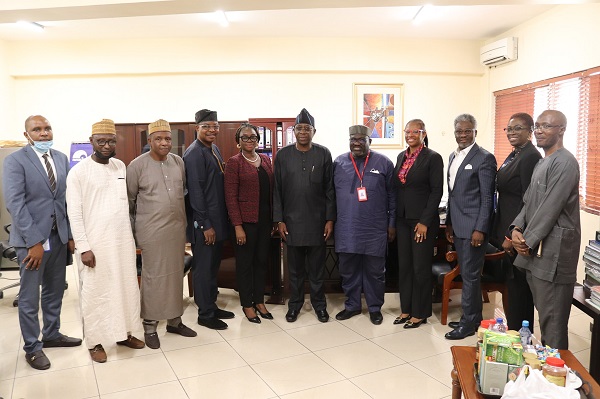
A fast-growing Information and Communications Technology (ICT) company, ipNX Nigeria Limited has commended the Nigerian Communications Commission (NCC) for its superlative regulatory activities, describing the commission’s actions as efficient and effective.
The ipNX group managing director, Ejovi Aror, gave this commendation when he led key members of the company’s management on a courtesy call on the commission at its headquarters in Abuja.
In his remarks, Aror also hinted at the company’s plan to expand its operations in Nigeria, in a manner that will heighten the role of the telecom sector in the growth of the Nigerian economy.
The ipNX GMD, also notified the commission that the operation of the company has come to a critical juncture, adding that the company is happy to migrate to a more strategic stage where it will play a greater role in expanding broadband infrastructures in Nigeria.
“Therefore, we are here to solicit your support for our plan to expand our businesses because we are at the threshold of closing a chapter and moving onto another, particularly in expanding broadband infrastructure which is critical to national development,” he said.
Also, Aror informed the management of NCC about some of its corporate social responsibility (CSR) programmes. The most central and significant of them, according to Aror, is the free Internet access to schools in Lagos and Oyo states.
Importantly, he revealed ipNX readiness to extend such services to other parts of the country, particularly in schools, because of the importance of ICT to educational development.
Responding to the ipNX delegation, the executive vice chairman of NCC, Prof. Umar Danbatta, who was represented by the commission’s executive commissioner, stakeholder management (ECSM), Adeleke Adewolu, thanked ipNX for the visit and for bearing witness that NCC’s regulatory activities have caused growth in leaps and bounds in the fortunes of the telecom ecosystem.
Danbatta declared that NCC is particularly gratified by the remarkable and quantifiable impact of the commission’s activities on the economy, including an increase in the sectoral contribution to gross domestic product (GDP).
The NCC boss promised that the encouraging words of ipNX’s delegation will spur the commission to put in more efforts towards achieving its mandate.
Putting in context the trajectory of landmarks in the telecom sector, he recalled the history of the evolution of the telecom industry in Nigeria, declaring that Decree 75 of 1992 which established the commission, was a great feat. Also, Danbatta said the courageous deregulation and liberalisation of the telecom sector by the Federal Government in 2000 was a masterstroke.
Danbatta said it triggered uncommon liberalisation that caused a rare leap in the democratisation of access to telephone services, from a few hundred hitherto existing fixed lines in 1992 to over 200 million subscriptions today.
Nudging ipNX to offer its best to the growth of the telecom sector, the ECSM stated that the outbreak of the COVID-19 pandemic and the capacity of the Nigerian economy to survive the contagion have demonstrated the importance of the telecom sector because most social and economic activities simply migrated to online platforms. “So, we are delighted about your interest in expanding broadband infrastructure”, Danbatta said to underscore the importance and contribution of broadband infrastructure to human survival at the peak of the COVID-19 pandemic.
Also, the EVC informed the visitors that the commission, with the supervision of the Ministry of Communications and Digital Economy, is ready and willing to partner with stakeholders to accomplish the objectives of the National Digital Economy Policy and Strategy (NDEPS) 2020-2030 and the Nigerian National Broadband Plan (NNBP) 2020-2025.
Danbatta, making the correlation between an increase in broadband infrastructure and the GDP of economies, asserted that the management of NCC is all out to work with all stakeholders, including its licensed infrastructure companies (InfraCos), to expand broadband access, especially to the unserved and underserved areas of the country.


